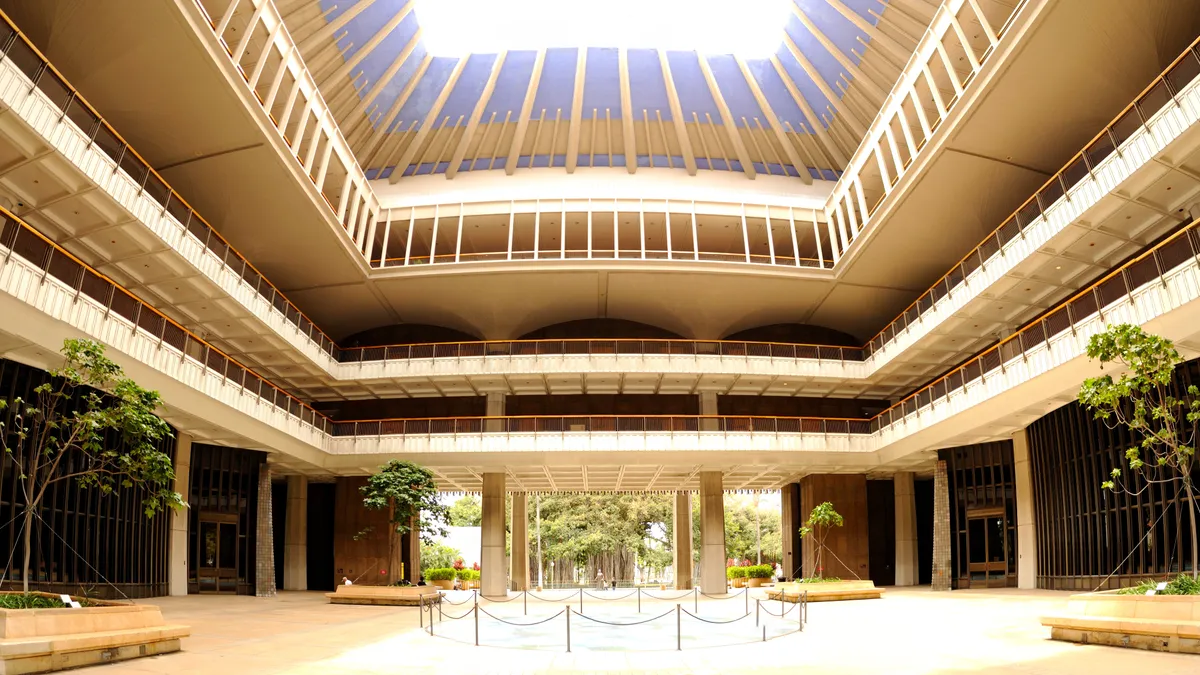UPDATE: March 6, 2019: The Hawaii State Senate voted 23 to 1 on Tuesday, with one vote excused, to advance a sweeping statewide plastics ban under SB 522. The measure now awaits approval from the Hawaii House of Representatives. Two other bills limiting the distribution of plastic products — SB 11 and SB 367 — were also passed.
Dive Brief:
- Hawaii is debating state legislation (Senate Bill 522) that would prohibit the purchase, sale, use or distribution of plastic items — including utensils, straws and polystyrene foam containers — by government agencies after July 1, 2021, and by businesses selling food and beverages a year later. SB 522 would also ban the distribution or sale of single-use plastic bags after July 1, 2023.
- The legislation would create a plastic source reduction working group that would formulate strategies for eliminating single-use plastic packaging — including developing "reusable container incentive programs for customers" and providing recommendations for composting plastics.
- Both the Senate's agriculture and environment committee and commerce, consumer protection and health committee unanimously passed the bill on Feb. 6. It's now been referred to the Senate's judiciary and ways and means committees.
Dive Insight:
Kamilo Point on the Big Island of Hawaii is a physical manifestation of the global plastics pollution crisis: its beaches, which are covered in mounds of plastic waste — utensils, fishing nets, food and beverage containers, furniture, microplastics — have been described as some of the "dirtiest" in the world. Now, Hawaii is evaluating whether and how SB 522 could provide relief from growing plastic pollution issues impacting the state.
"We have all seen the devastating effect upon wildlife that come from eating or becoming entangled in plastic debris and in Hawai'i it is a common occurrence," Senate Majority Leader J. Kalani English, one of six Democrats to introduce the bill, said in his January 2019 newsletter. "We must all do something to stop this trend."
SB 522 supporters submitted written and verbal comments to senators earlier this month, maintaining that the bill could help the state address the issue and protect the environment.
"Polystyrene foam containers are ultra-light, produce litter on land, and often are blown into the ocean, where they harm marine life, including sea birds, fish, mammals, and even our precious corals that protect Hawai'i's shorelines," Kimiko LaHaela Walter wrote on behalf of the Hawaii Reef and Ocean Coalition.
Other supporters, including Hawaii-based environmental organizations, echoed Walter's stance. The Surfrider Foundation’s Oahu chapter, the Pacific Whale Foundation, Zero Waste Oahu, Dolphin Quest and Sustainable Coastlines Hawaii all noted public health issues, and several individuals specifically cited the ever-increasing presence of microplastics.
While Hawaii has a de facto bag ban as a result of county policies, the proposed legislation has prompted renewed debate, with opponents raising concerns over increased operational costs, revenue loss and freedom of enterprise.
"It will raise the cost for both business and consumers and will impact jobs in the local manufacturing industry of FDA-approved, food-grade food service containers," the Chamber of Commerce Hawaii wrote.
National groups — including the International Bottled Water Association, the Plastics Industry Association, and the American Beverage Association, along with the Hawaii Restaurant Association, the Hawaii Food Industry Association, the Retail Merchants of Hawai’i and several small-business owners — also oppose the bill.
The legislation cites San Diego's recent move to reduce single-use plastics and polystyrene foam products as a potential blueprint. Hawaii and San Diego are each home to approximately 1.4 million residents.














